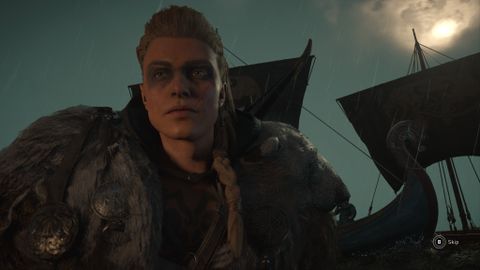Assassin's Creed has been a yearly franchise since Assassin's Creed 2 in 2009 all the way up until 2015 with the launch of Assassin's Creed Syndicate. After years of complaints that the series has grown stale, Ubisoft skipped a year before releasing Assassin's Creed Origins in 2017, what was its biggest departure from the series' formula to date, leaning more towards an RPG than ever before.
Ubisoft once again skipped any new Assassin's Creed release last year, but it has a lot less to show for it. Assassin's Creed Valhalla feels very much like Odyssey, which itself felt like a reskinned Origins with an emphasis on personal choice. Luckily, minor changes do impact gameplay in a big way, so it's not a complete rehash, but for as long as Valhalla's main story is, you'd think there would be more depth.
In a year where COVID-19 transformed how game developers work, it's hard to say what Valhalla may have looked like in a normal world. As it stands it's a great game, but one that I think could have done more to differentiate itself from its most recent predecessors. Everything from the gameplay loop and the way characters interact with the world around them feels recycled.
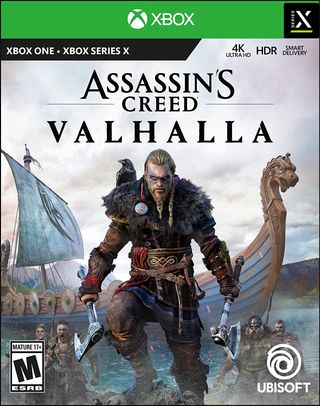
Bottom line: Assassin's Creed Valhalla provides a gorgeous playground to explore with excellent combat. Though the story seems unnecessarily long, it's a fun Viking tale mixed with the series' own flare and sci-fi elements.
For
- Enemy variety
- England is gorgeous
- Mythical worlds
- Modern day characters returning
- Small gameplay changes make a big impact
Against
- Frequent performance issues
- Main story can drag on
- Raids can be underwhelming
Assassin's Creed Valhalla Story and characters

| Category | GameNameXXX |
|---|---|
| Title | Assassin's Creed Valhalla |
| Developer | Ubisoft |
| Publisher | Ubisoft |
| Genre | Action/adventure |
| Xbox Version | Xbox One X |
| Game Size | 43.6GB |
| Play Time | 40 hours |
| Players | Single-player |
| Xbox Game Pass | No |
| Launch Price | $60 |
Much of the leadup to Assassin's Creed Valhalla was spent with Ubisoft explaining that your Viking clan sailed for England after war ravaged Norway, but it didn't at all play out like I expected. Instead of fleeing because of war, you flee because of peace. Eivor and their brother Sigurd are not happy that their father has pledged loyalty to a new king who means to unite the country, so they go to England to seek glory of their own. Going to England isn't so much about settling a new home, but about conquering new land — again, the opposite of what I was led to believe from Valhalla's marketing.
Valhalla strikes a good balance between the historical sections and present day.
The story in England is fairly linear. Sigurd and Eivor work to create and strengthen alliances in its various kingdoms, which mostly plays out as follows: help the Danes depose the current king or find friendly Saxons to help depose the sitting king. Either way you mostly end up with the same result that ends in an assault on a castle. There's some politicking involved, but I found much of the territory arcs to be "rinse and repeat," swapping out characters and locations for largely the same sequence of events.
There came a point maybe 20 hours or so in when I didn't feel like I was making an impact in any meaningful way. With Sigurd off securing alliances and Eivor doing the same, I spent my time running from territory to territory, assaulting castles and burning supply stockpiles to overthrow whoever was sitting on the throne. It didn't seem like there was any narrative incentive to do so other than "conquer more than." I don't know what my end goal was.
It gets more interesting once you come to learn how The Order of Ancients (Templars) have been pulling the strings behind the scenes and what they know of the Isu (the ancient species at the heart of the series). As controversial as these sci-fi elements are to the franchise's fans, they make the story so much better here. So much so that I would have liked to see more from it.
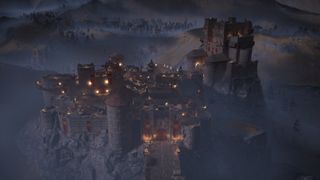
Ubisoft has struggled to balance the historical sections and the polarizing modern day narrative in Assassin's Creed over the years, succeeding to varying levels of affect. I think Valhalla strikes a good balance, giving enough content for modern day fans to enjoy while not distracting too much from the historical sections fans love. You can leave the Animus at any point once you progress past the opening of the game, and there are some fun Animus Anomaly parkour challenges that play into the series' sci-fi elements and lore.
Speaking of lore, mythical worlds like Asgard and Jotunheim are explorable after you unlock the Seer at your settlement. They offer a breath of fresh air to break up the landscapes of England, as beautiful as it may be. I know some were concerned about Valhalla's take on these myths given the success of God of War, but it's done so differently here that the comparisons are moot.
While I'd love to say I know how the story ends, I actually haven't been able to complete the game yet. That's how long Valhalla is. I've tried to get through it as fast as possible for this review, taking some detours to increase my power through raids and side objectives and whatnot, and even after 40 hours the end isn't in sight. That's a good thing for some people, but a big problem for others. Assassin's Creed Valhalla may have gotten rid of the bloat from side quests that plagued Odyssey, but it's no less full of cthings to do.
Assassin's Creed Valhalla Gameplay and combat
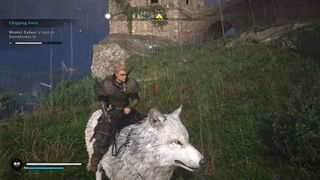
Assassin's Creed Valhalla brought back two beloved features in the franchise: one hit assassinations with the hidden blade and social stealth, and it's all the better for it. Assassinations have been a staple of the franchise since its inception, so to see it slowly disappear from the series the past few years was disappointing.
Assassin's Creed Valhalla brought back two beloved features in the franchise.
To make these assassinations less overpowered, you now have to unlock an ability in your skill tree that allows you to kill any enemy by completing a quick time event if they would be too powerful to one-hit kill otherwise.
Combat is now more varied with the addition of new enemy types that change the way you approach battle. I tended to default to my hack and slash method of swinging my axes to brute force my way through enemies, but I couldn't do that all of the time. Enemies with large spears will throw them at you, knocking you down from afar and leaving you vulnerable to other attacks. Heavy brutes might swing maces, so you need to wait for an opening and strike quickly. When other enemies have an unbreakable shield, you'll need perfect timing to dodge out of the way and deal a blow from behind.
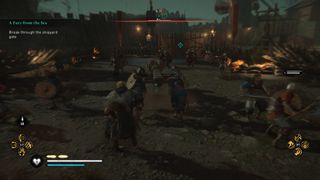
As for its raids, those range from interesting and fun to very underwhelming. The best raids are the castle assaults you'll complete at the end of a territory arc because they usually require specific objectives to beat. The regular raids found throughout the world are just some heavily guarded monasteries and other areas where you'll need to clear out the guards and open a few chests with the help of your raiding party.
Raids range from interesting to underwhelming.
Your raiding party will also sail with you on your longship, which I found myself never using more than I needed to for missions. Without naval combat, the only incentive to use your longship is quicker travel, and I found it was just more fun to use my mount to cross the country, especially when I could run into world events and other hidden treasures. You can't escape raiding though when you need resources to upgrade your settlement. By upgrading your settlement you'll unlock new missions and gain access to different activities, like fishing. I didn't find the settlement system to be anything special, but I did like having a home base I could come back to if I wanted to upgrade my gear and rest between main missions.
Try as Valhalla might, its attempt to forgo a traditional levelling system in favor of "power" doesn't work as I believe it intended to. Territories are now labelled with a recommended power level for Eivor. If you're only around 90, you don't want to be travelling to a territory with a power level of 160. It's a soft "level gating" that keeps the story and gameplay mostly linear. You're technically free to explore England to your heart's content, but you probably shouldn't. I would have much rather seen Valhalla do away with power/level systems entirely or have it so that enemies scale to your power to an extent.
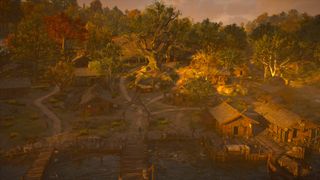
Even though I don't think the power system did enough to fix the inherent issues in effectively soft level gating territories, I do like how it changes the skill tree and affects your gear. Your skill tree now diverges into three branches: Wolf, Raven, and Bear. The more you invest in one branch, the more you can improve gear aligned to that same animal. For instance, because I'm equipped with all Raven-aligned gear, I get bonuses by investing more heavily in that branch.
Valhalla also drastically reduces the number of weapons and armor you'll find throughout the world, favoring upgrading, which can help make weapons unique instead of relying on levels to denote their worth. It's quality over quantity. The current axe I'm using right now happens to be the one I started the game with. I've been able to upgrade it enough that it's better than any other weapon I've come across. This holds true for any piece of gear you find. It'll never become obsolete so long as you upgrade it with the right resources.
Assassin's Creed Valhalla Performance
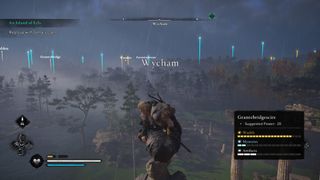
I said this in my earlier preview of Assassin's Creed Valhalla, but the game itself runs a bit rough. There's frequent screen tearing, visual glitches, animations clipping through one another — if there's a visual issue, it likely came up. Some of these are about what you'd expect if you've played Origins and Odyssey, but they felt more prevalent in Valhalla. At one point I needed to restart a mission because Eivor froze mid-air when I was trying to jump onto a ladder. I ran into other issues as well, but those were fixed in an update.
Regardless, I still wouldn't say any of these made the game unplayable. It's not like it crashed on me or stopped working or anything like that, but these annoyances popped up time and time again to rear their ugly heads.
Because I played on an Xbox One X, it's hard to say if some of these issues will persist on Xbox Series X or PS5. I'm inclined to believe at the very least there won't be as many visual glitches, but that may be wishful thinking on my part.
Assassin's Creed Valhalla Bottom line
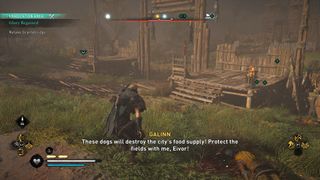
Assassin's Creed Valhalla combines the best aspects of the franchise into a saga that may be too long for its own good. Little changes like the hidden blade assassinations, social stealth, and a new power system go a long way to revitalizing its gameplay, but I'm not sure that's enough for some people.
Despite some pitfalls, Valhalla is a strong game with plenty to enjoy. It features a beautiful world to explore, interesting mythos, and engaging combat to keep you on your toes. If you were looking forward to Assassin's Creed Valhalla based on everything you've seen leading up to its release, I don't think you'll be disappointed.
_Assassin's Creed Valhalla will release on Nov. 10, 2020 on Xbox One, PS4, PC, and Stadia. It'll also be out on Xbox Series X|S and PS5.

Live out your Viking fantasy
Assassin's Creed Valhalla provides a gorgeous playground to explore with excellent combat. Though the story seems unnecessarily long, it's a fun Viking tale mixed with the series' own flare and sci-fi elements.
Jennifer Locke has been playing video games nearly her entire life, and is very happy Xbox is growing a stronger first-party portfolio. You can find her obsessing over Star Wars and other geeky things on Twitter @JenLocke95.
